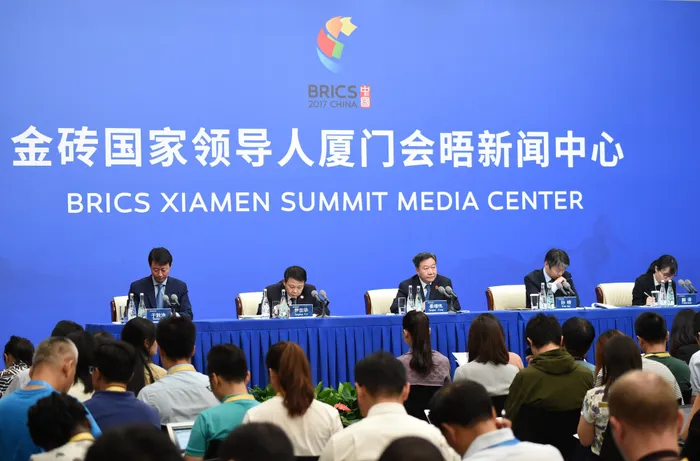
A press conference by the Organizing Committee of the BRICS Business Forum 2017 is held at the media centre for the 2017 BRICS Summit in Xiamen, southeast China's Fujian Province, Sept. 2, 2017. (Xinhua/Song Weiwei)(mcg) A press conference by the Organizing Committee of the BRICS Business Forum 2017 is held at the media centre for the 2017 BRICS Summit in Xiamen, southeast China's Fujian Province, Sept. 2, 2017. (Xinhua/Song Weiwei)(mcg)
This weekend, China is hosting the 9th Brics Summit - a meeting of leaders from Brazil, Russia, India, China and South Africa - in Xiamen.
The theme for this year’s summit is “BRICS: Stronger Partnership for a Brighter Future”.
China assumed the rotating presidency of Brics in January as the co-operation moves into its second decade.
Close to 1000 delegates are expected to attend the summit which begins tomorrow and ends on Tuesday.
Lourdes Casanova, academic director of Cornell University’s Emerging Markets Institute, said political and economic instability in Brazil and South Africa had solidified China’s lead position at the forum.
Casanova said: “The recently launched New Development Bank with an initial authorised capital of US$100billion is one of the clear marks of the nations’ co-operation so far. The bank is already funding seven projects for a total value of US$1.5bn in loans.
“Political instability has caused economic hardship in both Brazil and South Africa resulting in a much weaker international position for both countries; both were given an extension until the end of the year to join the China-led Asian Infrastructure Investment Bank.
“Hence, China’s position as the leader for the group is becoming stronger but the Brics group needs to balance their differences and the economic imbalances to maintain cohesiveness and stay productive.
“Before travelling to China this week, President Temer of Brazil launched a multibillion-dollar auction plan to offer investors infrastructure concessions, operating licences for airport, oil and power rights. China is already deeply invested in the Brazilian economy and Temer’s privatisation programme will open even more opportunities.”
However, in an article he penned, which was published yesterday in Xinhau, Russian President Vladimir Putin said: “It is important that our group’s activities are based on the principles of equality, respect for one another’s opinions and consensus. Within Brics, nothing is ever forced on anyone.
“This open and trust-based atmosphere is conducive to the successful implementation of our tasks."
Putin said Russia stood for closer co-ordination of the Brics countries’ foreign policies, primarily at the United Nations and Group of 20, as well as other international organisations.
“Only the combined efforts of all countries can help bring about global stability and find solutions to many acute
conflicts,” he wrote in the
article.
This week, Chinese experts suggested setting up a free trade area for the economic bloc to strengthen economic ties between Brics members, according to a report issued ahead of the summit.
The report, compiled by experts from the Chinese Academy of Social Sciences, a state-backed think-tank, pointed out the merits a Brics free-trade area would yield. They believe it would provide more advantages than disadvantages for the members’ economic development.
The report emphasised the goal of building an integrated market among members to improve the trade environment, especially as competition between Brics members on trade and economic interests’ increased.
Such an integrated market was first proposed by Chinese President Xi Jinping in 2013 at the Brics Durban Summit, the report noted.
The report called on members to strengthen Brics co-operation so that the organisation could hold more power in the global arena.
